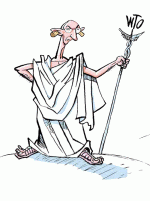Dubious dialogue
In late 1998, civil society campaigners contributed significantly to the collapse of Multilateral Agreement on Investment (MAI) negotiations. A year later, large-scale street protests disrupted the WTO summit in Seattle. International trade negotiators, long-used to decades of tranquil and undisturbed meetings, were shocked into a new era of often-turbulent public scrutiny. "It felt like a watershed", recounted EU Trade Commissioner Pascal Lamy a few years later.[1]
The European Commission was quick to react to the crisis. With a flurry of so-called 'civil society dialogue' meetings and occasional 'internet chats' with Trade Commissioner Lamy, it hoped to gain legitimacy for the EU's trade policies. At first this new openness seemed like good news: The EU trade policymaking process was traditionally accessible only to commercial-interest groups such as the industry and farming lobbies. But good news quickly turned to bad as the 'dialogue meetings' became short on dialogue and painfully long on rhetoric. Commission officials conducted the meetings more like briefings than fora for genuine two-way discussion about the fundaments of EU trade policy.
But this doesn't stop the Commission from trumpeting the dialogues at convenient moments. Take, for example, the case of the World Trade Organisation (WTO) General Agreement on Trade in Services (GATS) negotiations, which started in January 2000. Civil society opposition was growing and starting to spill over into parliaments across the EU. To counter the unrest, the Commission pointed eagerly to the dialogue meetings to create the impression that it was genuinely listening to outside concerns.
The reality is that civil society organisations were systematically denied access to key EU GATS negotiating documents, such as the EU's requests to 109 WTO member states to deregulate services such as drinking water delivery, tourism and banking. In contrast, the Commission secretively discussed in detail the contents of these documents with big European services corporations.
Not until November 2002 did the European Commission launch a high-profile 'public consultation' on GATS. Again, however, the Commission was listening with deaf ears. Civil society groups reacted with a highly successful e-mail action in which several thousand people protested against both the substance and process of the public consultation.[2] Six months later, Commissioner Lamy issued a statement thanking those who had commented and claimed that the consultation had a big impact on the final EU GATS offer. Lamy simply ignored the fact that more than 90% of the submissions to the consultation were GATS-critics calling for a moratorium on further negotiations and wanting nothing to do with an offer of any kind.[3]
The PR sham continues in the run-up to Cancun. In the week before the Cancun ministerial, a flurry of 'dialogue meetings' will be held in Brussels.[4] Also, Lamy himself will answer questions during a two-hour web-chat. None of this, unfortunately, will change anything in the Commission's plans for Cancun.
The Commission will no doubt defend its 'dialogue' record by pointing to presence of NGO representatives on the EU's Cancun delegation. These NGO representatives, however, are not only few in number, they do not have any formal influence over the EC's negotiating behaviour. They will receive progress reports from the Commission as events in Cancun unfold but, as is standard in EC interactions with civil society, it will be one-way traffic only.
Notes:
- Speech by Pascal Lamy, EU Trade Commissioner, Universiteit Nyenrode, 5 September 2002. Back
- Call for e-mail protest in reply to the European Commission's GATS Consultation, GATSwatch, November 2002. Back
- Reply from Commissioner Lamy to the submissions made in response to the public consultation launched in November 2002 in the DDA Services negotiations, June 2003. Back
- Harnessing Globalisation. Civil Society Dialogue. DG Trade website. Back
